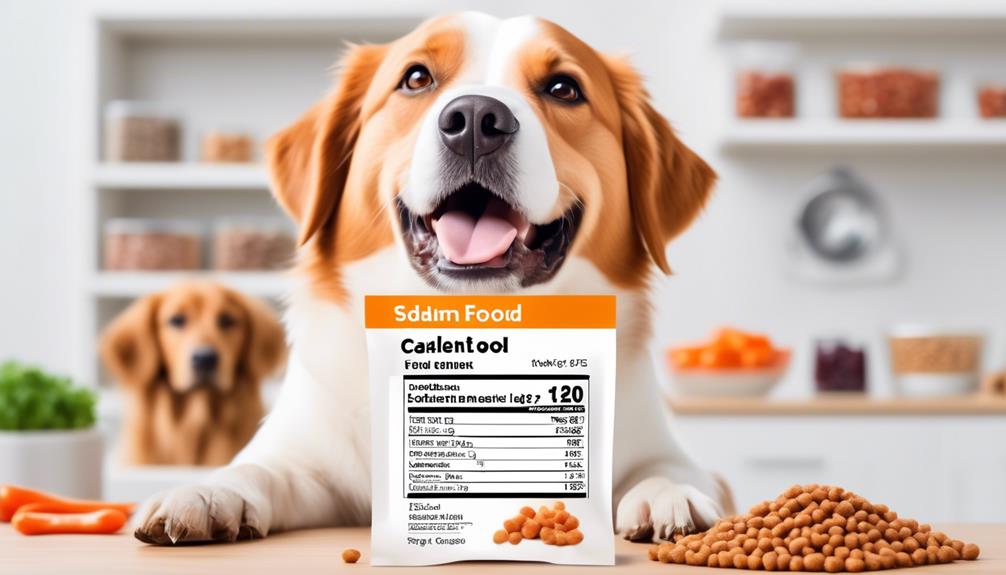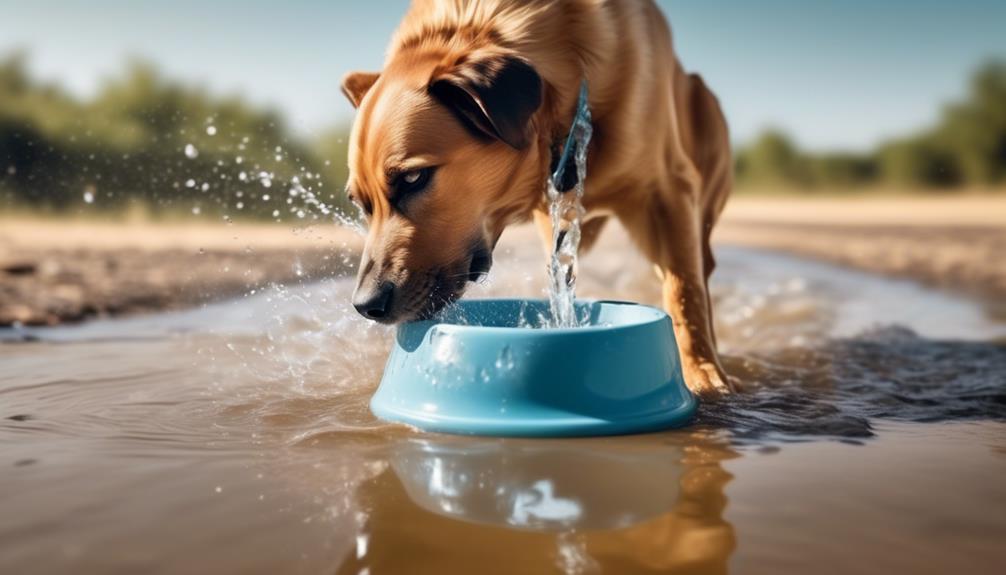Managing Your Dog's Kidney Disease Through Nutrition
Just like a well-oiled machine, your dog's body relies on proper nutrition to function smoothly.
When it comes to managing your dog's kidney disease, the role of nutrition becomes even more crucial.
It's not just about what you feed your furry friend, but also about understanding how certain dietary adjustments can significantly impact their kidney health.
As you navigate this journey, you'll uncover the power of specific nutrients and their ability to support your dog's kidneys.
But what exactly does this entail, and how can you ensure that your pup is receiving the best possible care through nutrition?
Understanding Kidney Disease in Dogs
If your dog has been diagnosed with kidney disease, understanding the condition is crucial for providing the best care and nutrition. Kidney disease in dogs can be challenging, but with the right knowledge, you can take steps to manage it effectively.
Early detection is key to controlling kidney disease in dogs. Regular check-ups and screenings can help identify the condition in its early stages, allowing for prompt intervention.
Preventing progression of kidney disease in dogs is essential for maintaining their quality of life. Once diagnosed, it's crucial to work closely with your veterinarian to develop a comprehensive treatment plan. This plan may include a special diet that supports kidney function while managing other aspects of your dog's health. Additionally, monitoring your dog's water intake is vital, as proper hydration can help support kidney function.
Understanding the signs of kidney disease is also crucial. Symptoms such as increased thirst, frequent urination, decreased appetite, weight loss, and lethargy should prompt a visit to the vet for a thorough evaluation. By being proactive and observant, you can aid in the early detection of kidney disease, allowing for timely intervention and management.
Importance of Low Protein Diet
What role does a low protein diet play in supporting kidney function for dogs with kidney disease?
When it comes to managing your dog's kidney disease, a low protein diet is crucial in reducing the workload on the kidneys. The kidneys are responsible for filtering waste products from the blood, and when they aren't functioning optimally, a high protein diet can lead to the buildup of toxic waste products, further compromising kidney function. By providing your dog with a low protein diet, you can help minimize the production of these waste products, thereby easing the burden on the kidneys.
Incorporating low protein alternatives into your dog's diet is essential. Look for commercial dog foods specifically formulated for kidney disease, as these will often contain reduced levels of high-quality protein to support your dog's nutritional needs while lessening the strain on their kidneys. Additionally, you can consider supplementing your dog's diet with fresh, high-quality ingredients such as cooked eggs, rice, and small amounts of lean meats, as these can offer a balance of essential nutrients without overloading the kidneys.
It's important to be mindful of dietary restrictions when implementing a low protein diet for your dog. Avoid giving your dog treats or table scraps that are high in protein, as these can counteract the benefits of a low protein diet. Always consult with your veterinarian to ensure that your dog's specific nutritional requirements are being met while managing their kidney disease.
Managing Phosphorus Intake
To manage your dog's kidney disease effectively, focus on controlling phosphorus intake through monitoring their diet and choosing low-phosphorus food options. Reducing phosphorus in your dog's diet is crucial for managing their kidney disease. When the kidneys aren't functioning as they should, they struggle to excrete excess phosphorus, leading to high phosphorus levels in the blood. This can further damage the kidneys and worsen your dog's condition. Therefore, implementing dietary restrictions to limit phosphorus intake is essential.
Phosphorus control is vital for maintaining your dog's renal function. High levels of phosphorus can lead to mineral and bone disorders, which are commonly associated with kidney disease. To manage phosphorus intake, opt for commercial dog foods specifically formulated for renal health. These foods are designed to be low in phosphorus, helping to support your dog's kidney function. Additionally, consider incorporating fresh, low-phosphorus ingredients into your dog's meals, such as white rice, green beans, and carrots. Be cautious with treats and table scraps, as these can also contribute to increased phosphorus levels in your dog's diet.
It's important to work closely with your veterinarian to determine the appropriate level of phosphorus restriction for your dog, as individual needs may vary. Regular monitoring of your dog's phosphorus levels through blood tests can help assess the effectiveness of the dietary changes. By managing your dog's phosphorus intake, you can play a proactive role in supporting their kidney health and overall well-being.
Essential Fatty Acids for Kidney Health
When managing your dog's kidney disease, incorporating essential fatty acids into their diet is crucial for supporting their renal health after controlling phosphorus intake. Balanced diets rich in omega-3 fatty acids can play a significant role in managing kidney disease and reducing inflammation. Omega-3 sources such as fish oil, flaxseed oil, and chia seeds can provide essential fatty acids that have anti-inflammatory properties, which can benefit dogs with kidney disease.
Including omega-3 fatty acids in your dog's diet can help maintain a healthy coat and skin, reduce blood pressure, and support overall heart health. These fatty acids also have the potential to improve kidney function and slow the progression of kidney disease. However, it's essential to consult with your veterinarian to determine the appropriate dosage and type of omega-3 supplements, as excessive amounts can have adverse effects.
When choosing omega-3 supplements for your dog, opt for high-quality sources to ensure they're free from contaminants and provide the maximum health benefits. Additionally, integrating these fatty acids into a well-balanced diet that aligns with your dog's specific nutritional requirements is crucial for their overall well-being.
Monitoring Sodium Levels

Keeping track of your dog's sodium intake is essential for managing their kidney disease and supporting their overall health. Sodium restrictions play a crucial role in managing kidney disease in dogs. High sodium levels can lead to increased blood pressure and fluid retention, putting additional strain on the already compromised kidneys. Monitoring your dog's sodium intake is vital in maintaining electrolyte balance and preventing further kidney damage.
To effectively monitor your dog's sodium levels, start by reading food labels and selecting low-sodium options. Avoid feeding your dog salty treats or table scraps, as these can significantly contribute to their overall sodium intake. Additionally, consider incorporating fresh, whole foods into their diet, as these are often naturally lower in sodium. Regularly consult with your veterinarian to discuss appropriate sodium levels for your dog's specific condition and to determine the most suitable dietary plan.
Electrolyte balance is essential for your dog's overall health, particularly when managing kidney disease. Sodium is a key electrolyte, and maintaining the right levels is crucial for proper bodily functions. By monitoring and controlling your dog's sodium intake, you can help prevent complications associated with kidney disease and support their overall well-being.
Nutritional Supplements for Kidney Support
Consider incorporating nutritional supplements into your dog's diet to support their kidney function and overall health. These supplements can play a crucial role in managing your dog's kidney disease and ensuring they receive the necessary nutrients.
Here are four key nutritional supplements to consider:
- Omega-3 Fatty Acids: Omega-3 fatty acids, such as fish oil, can help reduce inflammation and support kidney function. They also aid in maintaining a healthy coat and skin for your dog.
- B-complex Vitamins: B vitamins are essential for energy production, and they also support the nervous system. However, in dogs with kidney disease, their ability to absorb these vitamins may be compromised. Supplementing with B-complex vitamins can help bridge this gap.
- Antioxidants: Antioxidants like vitamin E and vitamin C can help protect the kidneys from further damage caused by free radicals. They also support the immune system, which is important for overall health.
- Herbal Remedies: Certain herbal supplements, such as astragalus and milk thistle, have been traditionally used to support kidney health in dogs. These herbs may aid in promoting kidney function and overall well-being.
When choosing nutritional supplements for your dog, it's important to ensure they're specifically formulated for dogs and are safe for use in kidney disease. Additionally, consider consulting with your veterinarian to determine the appropriate dosages and to ensure that the supplements won't interfere with any medications your dog may be taking.
Hydration and Kidney Function

Ensuring proper hydration is crucial for maintaining optimal kidney function in your dog. Hydration balance plays a vital role in supporting your dog's kidneys. Adequate water intake helps to flush out toxins and waste products from the body, relieving the kidneys of some of their workload. Additionally, proper hydration supports electrolyte regulation, which is essential for maintaining the balance of essential minerals in your dog's body.
To ensure your dog remains well-hydrated, always provide access to fresh, clean water. Monitor your dog's water intake, as dogs with kidney disease may have increased thirst. Encouraging regular water consumption is key to supporting kidney function. You can also consider adding water to your dog's food or offering wet food to increase their overall fluid intake.
Electrolyte regulation is another critical aspect of kidney function. Electrolytes such as sodium, potassium, and chloride play a crucial role in maintaining proper fluid balance in the body. In dogs with kidney disease, electrolyte imbalances can occur, leading to symptoms such as weakness, disorientation, and irregular heartbeats. Ensuring that your dog's electrolyte levels remain balanced through proper hydration and, if necessary, dietary adjustments is essential for supporting kidney function and overall well-being.
Creating a Customized Meal Plan
To develop a customized meal plan for your dog with kidney disease, assess their specific nutritional needs and consult with a veterinarian specialized in pet nutrition. This will ensure that the meal plan is tailored to your dog's individual requirements and health status.
When creating a meal plan, consider the following:
- Portion Control: It's crucial to manage the portion sizes of the meals you provide for your dog. Since dogs with kidney disease may have reduced appetites, it's important to ensure that they're receiving the right amount of food to maintain their weight and energy levels. Your veterinarian can help you determine the appropriate portion sizes based on your dog's size, weight, and activity level.
- Dietary Variety: Introducing a variety of foods into your dog's meal plan can help prevent nutrient deficiencies and make meals more enjoyable for your pet. However, it's essential to carefully select foods that are suitable for dogs with kidney disease. Work with your veterinarian to identify appropriate sources of protein, carbohydrates, and fats that align with your dog's dietary restrictions and preferences.
- Nutritional Supplements: Your veterinarian may recommend specific nutritional supplements to support your dog's kidney health. These supplements can include essential vitamins, minerals, and other nutrients that may be lacking in your dog's diet due to kidney disease.
- Monitoring and Adjusting: Once the meal plan is in place, it's important to monitor your dog's response to the new diet closely. Regularly assess their weight, appetite, energy levels, and overall well-being, and consult with your veterinarian to make any necessary adjustments to the meal plan.
Frequently Asked Questions
Can I Still Give My Dog Treats While Managing Their Kidney Disease Through Nutrition?
Yes, you can still give your dog treats while managing their kidney disease through nutrition, but there may be restrictions.
Consider kidney-friendly options as alternatives to traditional treats.
Training and rewards are still possible, so look for options that align with your dog's dietary needs.
You can explore homemade treats or commercial options specifically designed for dogs with kidney disease to ensure they can still enjoy a tasty reward.
How Often Should I Have My Dog's Kidney Function Tested While Following a Specialized Diet?
You should have your dog's kidney function tested regularly while following a specialized diet. This will help monitor the effectiveness of the diet in managing the kidney disease.
Your vet can advise you on the testing frequency based on your dog's specific condition. Regular testing will ensure that any necessary adjustments to the diet or treatment plan can be made in a timely manner to support your dog's kidney health.
Are There Any Specific Fruits or Vegetables That Are Especially Beneficial for Dogs With Kidney Disease?
You should consider specific fruits and vegetables that are especially beneficial for dogs with kidney disease. Best supplements can include blueberries and cranberries, which are high in antioxidants and may have anti-inflammatory properties.
When choosing fruits and vegetables, consider dietary restrictions such as low phosphorus and potassium levels. It's important to consult with your veterinarian to ensure the chosen fruits and vegetables align with your dog's specific dietary needs.
Can I Still Feed My Dog a Homemade Diet While Managing Their Kidney Disease, or Should I Stick to Commercial Prescription Diets?
You can still feed your dog a homemade diet while managing their kidney disease, but it's important to consult with your vet to ensure the diet meets their specific nutritional needs.
Commercial prescription diets are formulated to support kidney function, so they may be a more convenient option.
However, homemade diets can be tailored to your dog's preferences and dietary restrictions, providing a more personalized approach to managing their kidney disease.
Is It Necessary to Adjust My Dog's Portion Sizes or Feeding Frequency When Managing Their Kidney Disease Through Nutrition?
Yes, it's essential to adjust your dog's portion sizes and feeding frequency when managing their kidney disease through nutrition. This helps control their nutrient intake and reduces the workload on their kidneys.
Your vet can guide you on the appropriate adjustments based on your dog's specific condition. This tailored approach ensures your dog receives the right amount of nutrients while supporting their kidney health.
Conclusion
So, now you know the importance of managing your dog's kidney disease through nutrition.
By understanding the disease, focusing on a low protein and phosphorus diet, incorporating essential fatty acids, monitoring sodium levels, and using nutritional supplements, you can support your dog's kidney health.
Don't forget to ensure proper hydration and work with your vet to create a customized meal plan that meets your dog's specific needs.
With the right nutrition, you can help your dog live a healthier and happier life.
